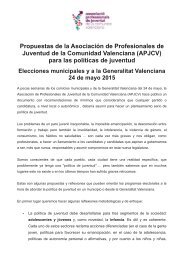c39dc
c39dc
c39dc
Create successful ePaper yourself
Turn your PDF publications into a flip-book with our unique Google optimized e-Paper software.
Pathways 2.0 paper argues that problem solving, intercultural skills,<br />
team spirit, creativity are fundamental competences, and are exactly<br />
the competences that young people acquire in non-formal leaning<br />
schemes of youth work. Similarly, the European Youth Forum Policy<br />
Paper on Youth Employment 20 , argues that through participation in<br />
youth organisations, young people learn to be committed, to show<br />
initiative and to take responsibility. They learn how to show respect<br />
for others by acquiring competencies such as communication and<br />
interpersonal interaction, conflict resolution, leadership,<br />
management, planning, team-working skills, and problem-solving<br />
skills. The European Youth Forum paper also argues that the<br />
competences that young people gain from non-formal education<br />
should be better recognized by employers and the labour market in<br />
general. The European Youth Forum policy paper on ‘Recognition of<br />
Non-Formal Education: Confirming the Real Competencies of young<br />
people in the Knowledge Society 21 , relates ‘soft skills’ to<br />
interpersonal, team working, organisational and conflict<br />
management, intercultural awareness, leadership, planning,<br />
coordination and practical problem-solving competences, selfconfidence,<br />
discipline and responsibility, provides a range of ways<br />
forward to achieve this.<br />
2.2 Soft- skills and competences<br />
Non-formal education leads to the development of ‘knowledge,<br />
skills and competences’. The European Qualifications<br />
Framework divides learning outcomes into knowledge, skills and<br />
competences and states that knowledge can be theoretical or factual.<br />
‘Skills’, on the other hand, means the ability to apply knowledge and<br />
use know-how to complete tasks and solve problems 22 . Skills can be<br />
divided into cognitive (involving the use of logical, intuitive and<br />
creative thinking) and practical (involving manual dexterity and the<br />
use of methods, materials, tools and instruments). Skills are also<br />
often divided into academic, generic, technical and soft skills 23 .<br />
Soft skills, the focus of this study, are the most difficult to define 24 .<br />
Yet, employers often report to value these skills as much as<br />
academic and/ or technical skills 25 , and that some young people have<br />
not developed the necessary ‘soft skills’ to market themselves<br />
effectively in the labour market. This is something which has been<br />
20 European Youth Forum (2007) Policy Paper on Youth Employment. Castelldefels, 2-3 May 2008.<br />
21 European Youth Forum (2005) Policy paper on ‘recognition of non-formal education: confirming the real<br />
competencies of young people in the knowledge society. Brussels, 11-12 November 2005.<br />
22 http://europa.eu/legislation_summaries/education_training_youth/vocational_training/c11104_en.htm<br />
23 Bimrose, J. and Barnes, S.A. (2011) Profiling systems for effective labour market integration. Mutual Learning<br />
programme reports, GHK and Budapest Institute.<br />
24 Bimrose, J. and Barnes, S.A. (2011) Profiling systems for effective labour market integration. Mutual Learning<br />
programme reports, GHK and Budapest Institute.<br />
25 Sondergaard, L. and Murthi, M. (2012) Skills, not just diplomas. Managing education for results in Eastern Europe<br />
and Central Asia. Washington, The World Bank.<br />
17




